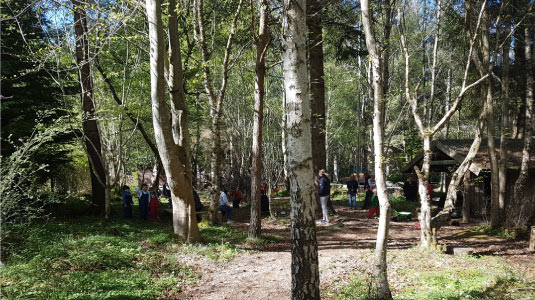SFC news published since 2018. See SFC archived content for earlier news articles.
Alison Malcolm on the challenge to recruit more men into the childcare workforce, and the innovative approaches being trialled by colleges to address this.

 Men are still as rare as hen’s teeth in nurseries around the UK. In Scotland they’re still only around 4% of the early years workforce, compared to roughly 3% in England. The tide is turning though, but it’s slow.
Men are still as rare as hen’s teeth in nurseries around the UK. In Scotland they’re still only around 4% of the early years workforce, compared to roughly 3% in England. The tide is turning though, but it’s slow.
In October last year, Minister for Children and Young People Maree Todd announced a £50,000 fund to address this very issue in Scotland. Last week, the English Children and Families Minister Nadhim Zahawi also announced a £30,000 fund for a project run by the Fatherhood Institute to encourage more men into the sector has drawn more attention to the issue.
The London Early Years Foundation and University of Wolverhampton published this second phase of their research [PDF] into the value of better representation by men in the early years workforce; which found that while children don’t care about the gender of their teacher, it does make a difference to their learning. The Fawcett Society launched a Commission on Gender Stereotypes which will be chaired by Rt Hon David Lammy, MP and Professor Becky Francis, Director of the UCL Institute of Education which will ‘examine the way we raise and educate our children, proposing practical changes to support parents and teachers’.
Could the dearth of men entering courses leading to careers in areas traditionally seen as ‘women’s work’ be something to do with the fact that, according to the Fawcett Society’s research [XLS], six in ten (59%) people polled agreed that ‘it is more acceptable for a girl to be a ‘tomboy’ than for a boy to be ‘feminine’, compared to just 11% who disagreed? Ridiculous but it’s certainly a likely factor, combined with the much maligned low wages and long hours in areas traditionally worked by women, including all areas of social and healthcare.
But as I said, the tide IS turning. Last week I visited Inverness College UHI, part of the University of the Highlands and Islands, which has been selected – alongside West Lothian College – to pilot new and innovative approaches to increasing the male ELC workforce. I caught up on the first quarter activity of their pilot and had the pleasure of meeting their teaching staff and a male HNC Childhood Practice student in the idyllic setting of their forest kindergarten at the Scottish School of Forestry.
Inverness College UHI and its partners across the University of the Highlands and Islands chose to approach the challenge by taking positive action in their recruitment and anticipated enrolling five men onto the course. However, following partnership wide marketing, they started their CHAMP course with 12 men in Inverness, two in Rothesay and two in Dunoon, their ages ranging from school leavers to career changers in their 50’s. Two of these men find the all-male cohort approach so supportive that they travel 60+ and 200+ miles each way to participate. Staff were blown away by the levels of interest in this introductory certificated 11 week evening course and they hope that most or all of the participants will continue onto the HNC in AY 2019-20 as the current male HNC students are very much in demand by the sector.
Inverness College UHI’s approach to teaching forest kindergarten skills is something which is growing across the sector, in response to demand for more places for children in early years settings. Staff have been careful not re-inforce gender stereotypes by assuming that this alone will attract more men to the sector but to embed it in training for all HNC Childhood Practice students. I look forward to following the progress of this pilot cohort for the rest of the year and even if it isn’t always that sunny in the forests around Inverness, at least rain means plenty of muddy puddles for little wellies and mud kitchens!

